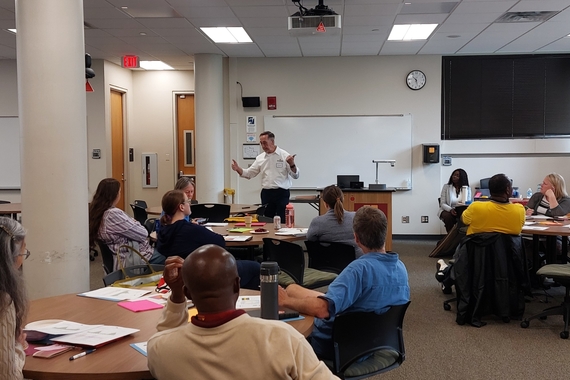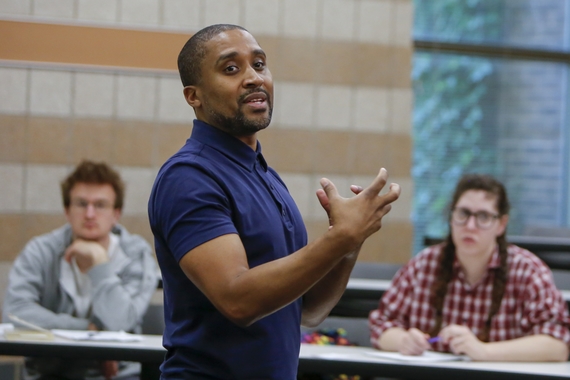African Studies Initiative Partners with Bemidji State University for 1st Annual Diverse Texts Conference
This past summer, African Studies Initiative and the Institute for Global Studies partnered with Bemidji State University (BSU) to organize a professional development conference focused on amplifying diverse voices in K-12 literature.
The 1st Annual Diverse Texts Conference: Connecting Students and Stories with Diverse Texts, hosted by BSU on July 25, focused on youth literature that represents diverse identities and experiences. A series of presentations from activists, scholars and authors immersed teachers in books that highlighted different cultures, disabilities, gender norms and global affairs.
The African Studies Initiative (ASI) and the Institute for Global Studies funded this conference through their International and African Title VI National Resource Centers. For the past three years, these grants supported the Globalizing Rural Teacher Training Programs, a collaborative project with BSU and alumni from the National Education Association (NEA) Foundation Global Learning Fellowship.
The Diverse Texts Conference was a result of the Globalizing Rural Teacher Training Programs, which aims to increase international studies resources in rural classrooms.
Awa Saidy, who became the new assistant director of ASI in June, said that as a land-grant university, UMN has a special responsibility to lead efforts that expand education about diverse groups.
“Representation matters, agency matters,” Saidy said. “So I think it's important to promote diversity within the context of the university. Not just the rhetoric, but actually do the activities that promote diversity.”
The idea for this Diverse Texts conference came from Kathrina O’Connell, an assistant professor of professional education at BSU and one of the conference organizers.
Every semester, the undergraduate students in her language arts course volunteer at public schools for pre-service teaching experience. One of their requirements is to do a read-aloud of a diverse text in their classrooms.
Through this, O’Connell realized the most effective way to advocate for diverse literature is to connect directly with educators in Minnesota schools — not only instructors of languages or literature, but also science, social studies and every K-12 discipline.
“This conference was set out to have these discussions and to encourage teachers to look again at: ‘Okay, what texts am I using in my classroom and how can I embed more diversity in those texts?’,” O’Connell said. “And when I say embed more, I'm not saying that we have just a shelf. With diverse texts, it needs to be embedded all the time.”
To further discussions on integrating diverse texts into curriculum, the conference included presentations from five public school teachers who participated in the NEA Global Fellowship. The annual program selects one delegate from each state and includes cross-cultural training, a professional workshop and field experience in a foreign country to gain international perspectives on teaching.
One of these fellows that presented at the conference was Colleen Parker, a special education teacher at Simley High School in Inver Grove Heights, Minnesota. Parker conducted a hands-on workshop on incorporating indigenous texts into lesson plans.
“We talked about really how multicultural literature creates that opportunity to explore and connect with the world beyond your own experiences,” Parker said.
Parker has made cultural competency a foundational part of her special education teaching. She has even written grants to bring hands-on learning into her classroom, partnering with organizations such as H20 for Life and Urban Boat Builders.
“I would not have the same positive environment, I think, without that community building – that is very purposeful and planned and strategic for our students – based on bringing that whole idea of the diverse texts into the classroom and celebrating all cultures.”
Based on this idea of fostering community around culture, Saidy organized a supplemental event to the Diverse Texts conference: a small gathering with the five NEA fellows, BSU’s African international students, faculty that teach African Studies and some of the school’s administrators, including President John Hoffman.
Saidy organized the meeting to connect with the international students and share stories about her undergraduate experiences at BSU. Saidy attended the university as an international student from the Gambia and emphasized the importance of empowering diverse perspectives in classrooms.
“I found my voice at BSU as an international student,” Saidy said. “It was a really nurturing and engaging environment for me.”
In addition to the Diverse Texts Conference, funding from the Institute for Global Studies’ International and African Title VI National Resource Centers has also been used for a large-scale book drive at BSU to make multicultural texts accessible to educators in rural Minnesota.
“We've funded nearly $10,000 dollars worth of books between the international and the African grants for the Bemidji State University teacher training library, and a lot of these are Title VI award-winning books,” said Deborah Jane, the outreach coordinator for the Institute for Global Studies.
Jane said she has been working with O’Connell to plan for future events centered on international and African themes. They hope to hold the Diverse Texts Conference again next year, O’Connell said.
Saidy is a strong proponent of continuing collaborative, engaging projects to support cross-cultural competency across Minnesota, especially when it comes to diverse literature.
“Students, anyone should be able to read those books and understand the culture behind those books,” Saidy said. “It was a really representative conference.”

